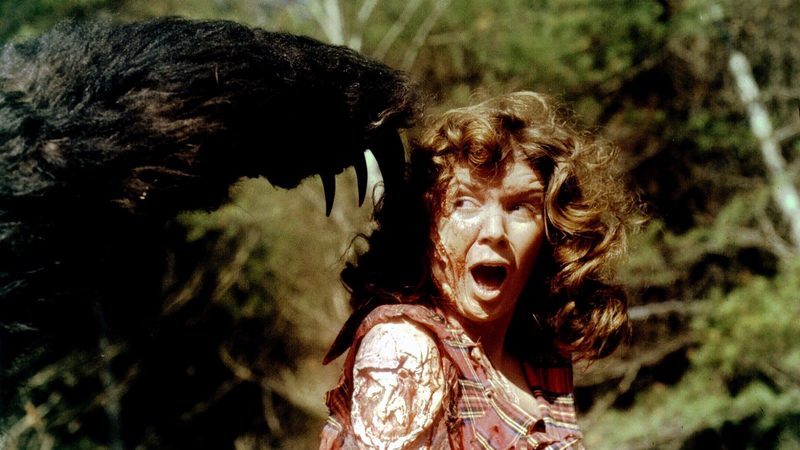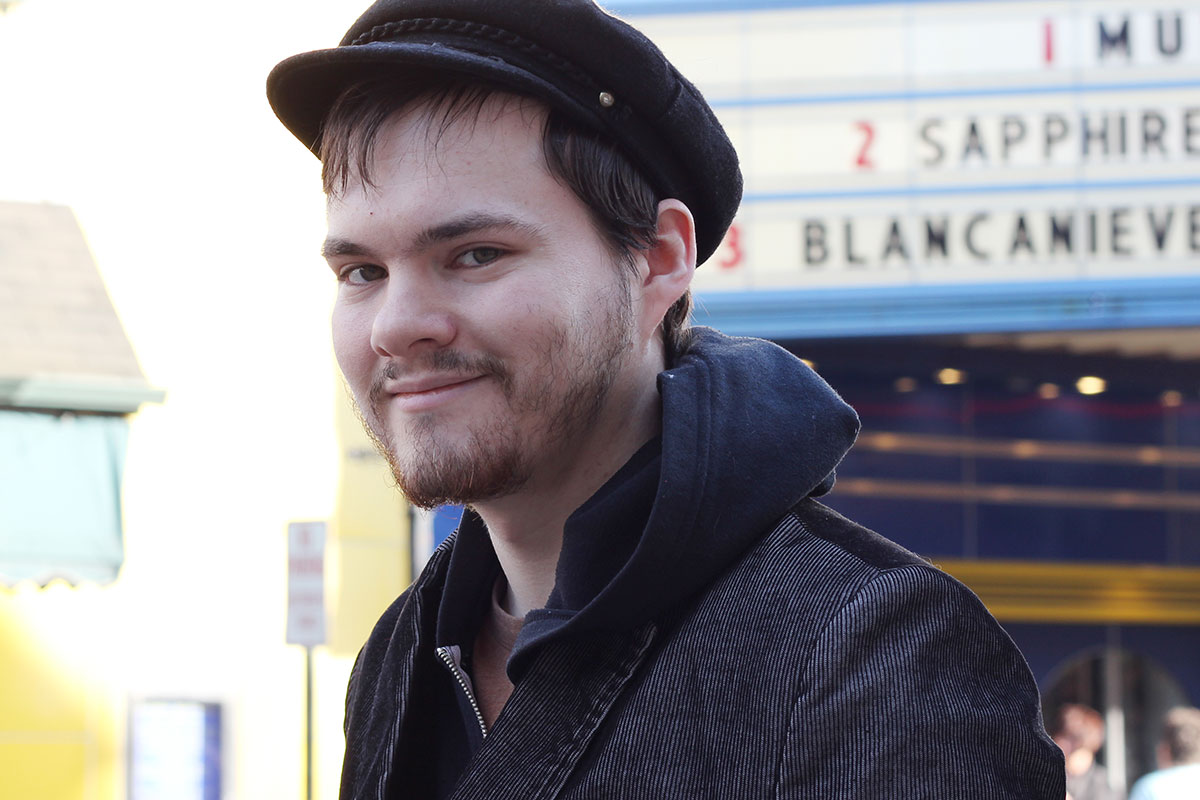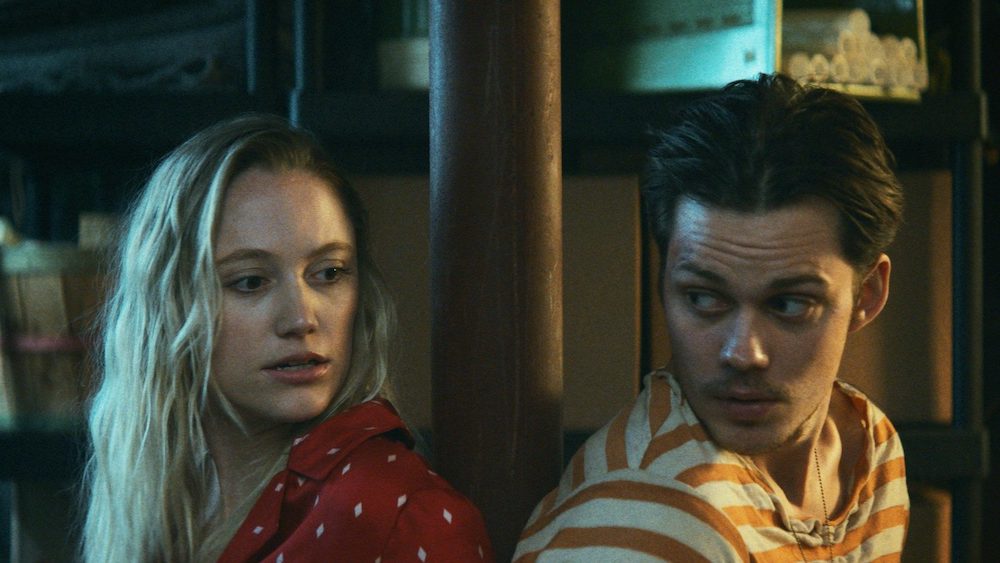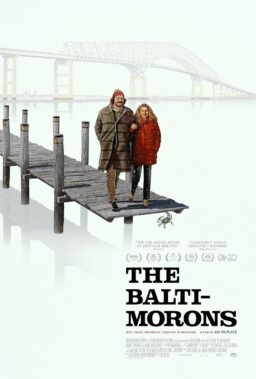There are many reasons to look forward to Film at Lincoln Center’s annual “Scary Movies” festival, not the least the opportunity to see what people are afraid of outside of your zone of fears and neuroses. What keeps people clutching the covers and sleeping with the light on in Sweden, Mexico, France, Ireland and Germany? There’s fun to be had imagining what cultural differences and individualized trauma has done to warp genre tropes across the globe, but there’s also a certain comfort knowing that no matter how far you travel, you’ll find people worried about a man with a knife standing in darkness or the devil coming to collect on a debt. The more things change, the more we scream the same.
The “big” American movies of the series, the ones you may have heard of, share a common thread and it leads to a thousand-dollar suit. Robert Olsen & Dan Berk’s “Villains” is the opening night film, Matt Bettinelli-Olpin & Tyler Gillett’s “Ready or Not” the closer, and in between you’ll find a repertory screening of Jon Amiel’s “Copycat,” the director’s cut of Ari Aster’s “Midsommar,” and the New York premiere of the Blumhouse funded “Bloodline” by Henry Jacobsen. These are the films with the big names in the cast and the very American psychologies, including a fear of and eerie dependency on the illusion that wealth comes with a moral high ground.
In “Villains,” two drugged up morons (Pennywise himself Bill Skarsgård and “It Follows”’ Maika Monroe) flee a gas station robbery into the nicest house they can find to hide out. It soon becomes apparent they’ve chosen the wrong place to hide out when they explore the basement. The veneer of class and even the false warmth of the owners of the house (Kyra Sedgwick and Jeffrey Donovan, both delightful) makes the intruders suspect any number of things about them, even as they keep giving them reasons not to trust even the character of their derangement. Wealth buys trust even when you don’t you’re falling for it.

“Ready or Not” doubles down on this idea with aplomb. The directors, known collectively as Radio Silence, pit a blushing bride against a clan of foppish maniacs who believe she holds the key to the survival of their dominion. A years ago pact with the devil grips them like a fever and the heroine winds up bloodied and half-crazed fighting off the bickering billionaires. The heroines only mistake was believing they’d be human under all that wealth. (Watch for a full review early next week.)
Trust is easily granted but difficult to maintain across the line-up. The pleasant face put on by the Swedish cultists in Aster’s “Midsommar” betrays an ancient ruthlessness, a communal desire to carry on with ancient ritual so strong it will casually murder, drug and coerce whosoever gets In the way. The leads are too seduced by the place’s potential to improve their mood to worry whether they’ll ever leave. “Bloodline,” a cold-blooded American Giallo features Seann William Scott at the top of his game as a humorless social worker with a pregnant wife. He lets his patients talk to him about their troubled family lives and then waits until he hears something he can’t forgive. Then he goes and finds the deadbeat parents responsible for the scars. The intriguing twist is that Scott’s ice-veined avenging angel has his own selfish motivation for “helping” the less fortunate and it’s hiding in his past, awakened by the appearance of his mother (Dale Dickey, always welcome) to help with the incoming baby. Director Henry Jacobsen isn’t out to reinvent the wheel and yet mines a metric ton of tension from the hopelessness underlining every set piece. It’s assured, simple and chilling.
In “Copycat,” an agoraphobic criminal psychologist (Sigourney Weaver) is coaxed out of retirement by a scrappy detective (Holly Hunter) to help solve a string of grisly murders across San Francisco. Weaver’s come to rely on her chic surroundings to keep her mentally stable after a serial killer (Harry Connick, Jr) became obsessed with and then tried to murder her. She puts enough faith in Hunter and her handsome partner (Dermot Mulroney) that she lets her guard down and in walks this new killer. Amiel’s mise-en-scene is perhaps too tidy to commit to his “Silence of the Lambs” riff fully but Weaver and Hunter have tremendous bitchy chemistry that they make the movie worth watching over and over. “Copycat” plays in a section the programmers have dubbed “Agora-Horror,” along with Alistair Banks Griffin’s “The Wolf Hour,” starring Naomi Watts as a writer afraid to leave her apartment at the height of the Summer of Sam, but there’s a certain agoraphobic touch in nearly all of these films.

Meanwhile, the great outdoors are filled with gruesome possibility in the ursine retro double feature “Grizzly” (1976) and “Prophecy” (1979). Neither film has much of a reputation to speak of beyond their occasionally campy highs (“Prophecy” is more famous for a scene of a bear making a sleeping bag-bound little boy explode into a cloud of feathers than anything else) but they make for a lush, earnest double bill. Back when it wasn’t uncommon for filmmakers to drag us to the most beautiful places on earth and then have nature turn on everyone as a way to remind us not to use hairspray. If only we’d listened.
In Søren Juul Petersen’s “Finale,” two Danish service station employees, Agnes (Anne Bergfeld) and Belinda (Karin Michelsen) begin to notice strange things happening during their graveyard shift. There’s the two guys who insist on filming Agnes with their camcorder, who claim the woman taped up in the backseat is a blow-up doll. There’s the weird guy who wants to know the score of a big sporting event despite their being no tv or radio in evidence in the shop. And there’s Belinda’s boyfriend who keeps showing up at the worst times. The two women begin to view the space just outside the window as a terrifying blindspot, but they’ll pray for its relative safety when they find themselves at the mercy of a man who looks eerily familiar who calls himself The Ringmaster.
All these themes coalesce magisterially in Andrew Desmond’s “The Sonata,” the kind of go-for-broke movie you love to see directors still committing to. Freya Tingley plays Rose Fisher, a virtuoso violinist who inherits her father’s mansion after his suicide. It’s a lot to process but she won’t really get time because with his death come realizations and shoes dropping left and right. Her manager Charles (Simon Abkarian) is put out that Rose never mentioned that dad was classical music’s bad boy Richard Marlowe (Rutger Hauer in one of his last performances and as always a soulful marvel). Of course when he discovers that he wrote one last piece of music, he instantly plans to publish it and take his share of the royalties so maybe she was right to distrust him. Of course the piece is anything but ordinary, even for the famously avant-garde leaning Marlowe. Some of the notes are written in an ink only visible in candle light, and Marlowe’s research appears to have involved chaining local boys to an alter and recording their screams. Rose isn’t so sure after that she ever wants to hear the finished work, but Charles has too much wrapped up in its publication to stop now. Desmond’s camera work is crisp and elegant, finding delectable gothic tableaux across the spooky Marlowe estate. The CGI wants a little for naturalism, but this film is far from naturalist, indeed it’s a full bore haunted house romp and nearly the most fun film in the line-up.

The most fun is Mike Ahern & Enda Loughman’s “Extra Ordinary”, an Irish comedy about a woman (Maeve Higgins, who also wrote some of her own material) rejecting her destiny as her town’s ghost whisperer after she killed her father in an exorcism accident. She’s called out of self-imposed retirement (shades of “Copycat”) when a handsome widower named Martin Martin (Barry Ward) comes to him for help getting his dead wife’s ghost out of the house. Rose decides she can’t help but come to Martin’s aid after a satan-worshipping musician decides to use Barry’s daughter Sarah (Emma Coleman) as a virgin sacrifice so the devil will gift him with a second hit song. The film is hilarious from the word go (“Do you ever feel ill after eating cheese? You may have eaten a ghost!”) and it’s one of the few horror comedies post-“Shaun of the Dead” to use the editing bay and camera as a tool for comedy on par with the razor-sharp writing. Higgins is something of a veteran of cult comedy TV and web series, but this is her proper film debut. She’s charming and lovable, a sort of Irish Phoebe Waller-Bridge, backed up by Will Forte and Claudia O’Doherty as her nemeses. It’s the rare horror comedy that’s so funny you forget lives are at stake.
“Extra Ordinary” is framed by footage from Rose’s father’s old VHS series on ghost hunting and it’s always fun to see old technology mined for laughs as well as scares in the Scary Movies line-up. In both Andrés Kaiser’s “Feral” and Adrián García Bogliano’s “Black Circle,” hauntings come courtesy of old records. “Feral” follows the exploits of a priest who filmed his efforts to teach feral foundlings language. It goes as well as you expect. In “Black Circle,” two sisters get a hold of an out-of-print meditation LP that starts giving them nightmares from which they wake coated head-to-toe in a sort of “Invasion of the Body Snatchers”-style film. They go to a medium (the iconic Christina Lindberg, Sweden’s Barbara Steele) for help. “Black Circle” has outré energy to spare, from the warped film look of the sisters’ hallucinations and the instructional-style segments explaining what’s happening to them. Bogliano has rarely been this aesthetically radical and formally tight.
Family troubles also plague the heroes of Emilio Portes’ pitch-dark “Belzebuth” and “All the Gods in the Sky,” the latter directed by a man who calls himself Quarxx. “Belzebuth” follows a rash of hideous child murders investigated by a cop (the great Joaquín Cosío) who lost his family during one such attack. The devil also puts in a welcome appearance here. “All The Gods In the Sky” is classic New French Extremism (think “Sheitan” or “Martyrs”), following a man caring for his sister decades after she blew most of her face off with a gun when they were kids. Social services reason from his behavior at work that he’s no longer up to the task of looking after her, but his devotion to her turns from uncomfortable to full-on mania as they close in on him. He’s waiting for something, you see, and he won’t let anyone interfere before he and his sister get their reward for their patience.
Everyone in these movies finds themselves between the devil and a hard place, one way or another. You can’t bargain with it, you can’t defeat it, you have to face it, and accept that you will no longer be the person you were on the other side. The films of this year’s scary movies line-up ask us not only to stare evil in the face, but to ask if we’re equal to the task of remaining human in its reflection. Whichever film you see, you’ll be glad for the scares, the laughs, the reminder of what it feels like to be alive.












